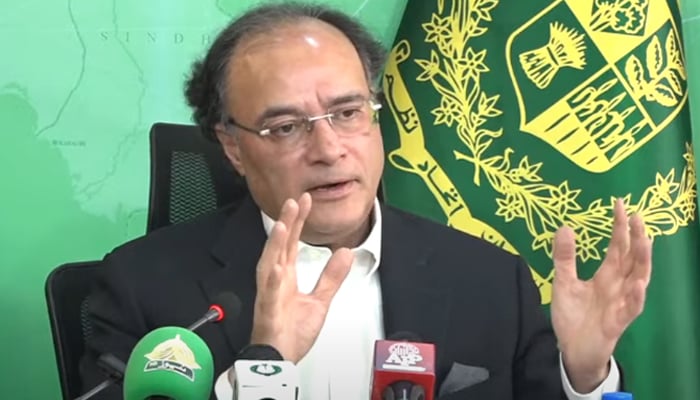
- US remains Pakistan’s largest export destination.
- Steering, working groups formed for response.
- Pakistan seeks to finalise deal before April 9.
Finance Minister Muhammad Aurangzeb expressed optimism that the current concerns around US tariffs could be transformed into a mutually beneficial opportunity for both countries.
“We want to make sure that we, in terms of our representations, put forward how we see it in the medium to long term as a win-win situation for both Pakistan and the US,” Aurangzeb said during a press conference in Islamabad on Saturday.
US President Donald Trump has imposed a staggering 29% tariff on imports from Pakistan — one of the sharpest economic strikes in recent history.
The US remains Pakistan’s top export destination, and according to the State Bank of Pakistan, total exports to the US during the fiscal year 2023-24 amounted to $5.44 billion.
This unprecedented levy, part of the most aggressive US trade policy in almost a century, has rattled global markets and put emerging economies on edge.
For Pakistan, whose textile industry heavily relies on exports to the US, this tariff is more than just a financial setback — it’s a direct hit to its economic backbone.
The country of over 240 million people now faces a 29% tariff (set to begin on April 9) on its exports to the US, significantly higher than the 10% baseline, which came into effect on April 5 (today). After April 9, all Pakistani exports will be charged a 39% tariff.
A veteran banker, the finance minister emphasised that Islamabad views the issue not only as a challenge but also as a chance to deepen economic cooperation with its largest export market.
He highlighted that the United States is an important strategic and trade partner for Pakistan, adding that the government is approaching the matter with a comprehensive response plan.
To that end, Prime Minister Shehbaz Sharif has constituted two specialised bodies: a steering committee chaired by Aurangzeb himself and comprising ministers, prominent business leaders, secretaries, and academics; and a working group led by the secretary of commerce.
Aurangzeb noted that while the situation presents immediate challenges, it also opens doors for negotiation and long-term engagement. “You should never let a good crisis go to waste,” he remarked, underlining the government’s intention to formulate and present a well-structured package to the US administration.
The finance minister said the recommendations are expected to be finalised in the coming days and submitted to the prime minister for approval.
Following that, a high-level delegation will travel to Washington to convey Pakistan’s position and further dialogue with US officials. He affirmed that Islamabad remains “very constructively engaged” and hopes to strengthen the relationship through strategic discussions before the upcoming April 9 deadline of the 29% tariff.



